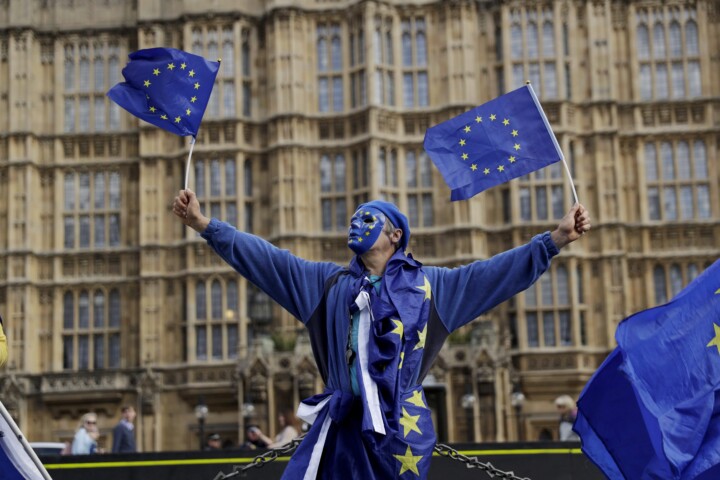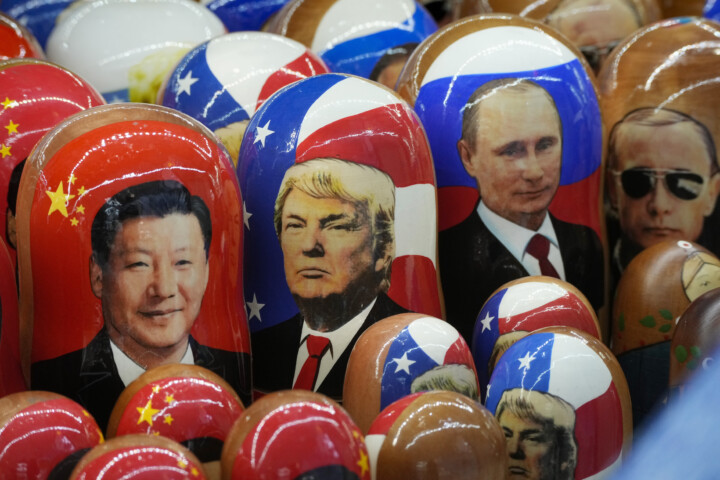
‘It’s up to us’: Timothy Garton Ash on whether Europe is doomed
Timothy Garton Ash insists reports of the death of Europe are greatly exaggerated. The Oxford historian says the continent can overcome war, disunity, and economic pains. Seventy plus years on, Garton Ash says, the European Union will play a pivotal role in the new international order, and that it’s time for Canada to join the club.
His latest book is Homelands: A Personal History of Europe.
The following is an excerpt from the Prologue of Homelands by Timothy Garton Ash.
In a small front room, amid the unfamiliar smells of Gauloise tobacco smoke and strong black coffee, I sit with my French host family staring at a small black-and-white television screen. I am fourteen years old, on a school exchange, and helping to translate. ‘Armstrong il dit: un petit pas pour moi, un grand pas pour l’humanité!’ Soon a shadowy figure in a spacesuit is taking weightless leaps across the surface of the moon, a scene entirely familiar to me from the Tintin book Explorers on the Moon.
It’s hard to recover a sense of just how remote continental Europe was to an English schoolboy in 1969. I won’t say that France seemed as far away as the moon, but it was everything the English have traditionally packed into the word ‘foreign’. Over there they eat frogs, ride scooters and have oodles of sex. Whatever you do, don’t drink the water. Reaching the town of La Rochelle, on the Atlantic coast, had involved a seemingly endless journey by bus, tube, train, ferry (violently seasick), train and bus again. My brand-new, stiff-backed, very dark blue British passport had been closely examined and stamped at the frontier post. In my pocket, I nervously fingered some crisp, enormous French franc notes. To telephone home was a complicated procedure that involved wrestling with an operator down a crackling landline in bad French (‘Peut on reverser les charges?’).
Twenty years later, I was at a dissident rally in Budapest, signing copies of a Hungarian-language edition of my essays about central Europe. It was that year of wonders, 1989. Freedom and Europe – the two political causes closest to my heart – were marching forward arm in arm, to the music of Beethoven’s ninth symphony, heralding a peaceful revolution that would open a new chapter of European and world history. No part of the continent was ‘foreign’ to me anymore. Living the paradox that encapsulates what it is to be a contemporary European, I was at home abroad.
So much at home, in fact, that one of my Hungarian friends turned to me, as we walked back through the warm, sensual streets of Budapest, and exclaimed, ‘You must be descended from Scholem Asch!’
‘No,’ I replied, slightly taken aback.
‘Then how come you’re so interested in central Europe?’
As if a genetic explanation were somehow required for being emotionally involved in another part of Europe.
Our identities are given but also made. We can’t choose our parents, but we can choose who we become. ‘Basically I’m Chinese,’ Franz Kafka wrote in a postcard to his fiancée. If I say ‘basically I’m a central Euro- pean’ I’m not literally claiming descent from the central European Yid- dish writer Asch, but declaring an elective affinity.
Since my birthplace is Wimbledon, England, I was indubitably born in Europe and therefore, in that rudimentary sense, born a European. Mapmakers, all the way back to Eratosthenes some 2,200 years ago, have always placed Britain in Europe, a region counterposed to Asia and Africa in what is probably the oldest continuous mental subdivision of the world. So long as there has been a geographical notion of Europe, our vaguely triangular islands have been part of it. But I was not ‘born a European’ in the stronger sense of being brought up to think of myself as one.
The only time my mother referred to herself as a European was when she reminisced about her youth in British-ruled India, where she was born a daughter of the Raj. ‘As a European,’ she told me, happily recalling some romantic months spent as a young woman in New Delhi at the end of the Second World War, ‘one went out riding early in the morning.’ In India, the English called themselves Europeans. Only back home do they still often like to deny a truth that seems self-evident to anyone looking at them from Washington, Beijing, Siberia or Tasmania.
I never heard my father talk of himself as a European, even though his formative experience had been landing on a Normandy beach with the first wave of British troops on D-Day and fighting with the liberation armies all the way across northern Europe, until he quietly, exhaustedly welcomed VE (Victory in Europe) Day in a tank somewhere on the north German plain. One of his favoured Conservative prime ministers, Harold Macmillan, supposedly remarked of the legendary French president Charles de Gaulle that ‘he says Europe and means France’. But that was equally true of Englishmen of my father’s ilk. When they said Europe they meant in the first place France, as the English had done for at least six centuries, since the Hundred Years’ War shaped the national identities of France and England, each against the other.
For my father, Europe was definitely foreign and the European Union was one of those ‘knavish tricks’ that our national anthem calls upon patriotic Brits to frustrate. I once gave him a large chocolate euro for Christmas and he promptly devoured it, gnashing his teeth with theatrical delight. A lifelong, active Conservative, in his old age he briefly, to my horror, defected to UKIP, the UK Independence Party. Had he still been alive in 2016, he would undoubtedly have voted for Brexit.
I feel myself blessed by historical luck to have grown up in England, a land that I love; but that geographical fact did not make me a European. I became a conscious European some time between that first schoolboy inhalation of Gauloise tobacco smoke in 1969 and signing books in revolutionary Budapest in 1989. My diary for Friday 12 August 1977 records an evening spent in a West Berlin pizzeria with Karl, an Austrian ‘electrician, film guide and taxi driver’, whom my toffee-nosed twenty-two-year-old Oxford graduate self describes as ‘a recognisably civilised fellow European’. (Wouldn’t do to have an uncivilised pizza companion, would it?) Still and all, a fellow European.
This book is a personal history of Europe. It’s not an autobiography. Rather, this is history illustrated by memoir. I draw on my own journals, notebooks, photographs, memories, reading, watching and listening over the last half-century, but also on the recollections of others. So when I say ‘personal’ history, I don’t just mean ‘my own’; I mean history as experienced by individual people and exemplified by their stories. I quote from my conversations with European leaders where this helps to illuminate the story but also from many encounters with so-called ordinary people, who are often more remarkable human beings than their leaders.



